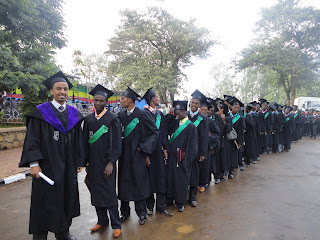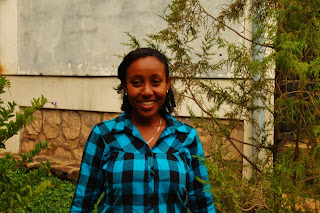Hi All, this week I decided to interview a couple of the new M.Sc students here at JUCAVM in lieu of the usual update. It's a short discussion meant to give the reader perspective on the students' motivation behind studying Post-Harvest Management, the need of such programs in Ethiopia, and their ideas on what they can do to solve agricultural problems. Enjoy!
Manny
Jimma University College of Agriculture and Veterinary Medicine. July 3, 2012.
Gerefa Sefu and Misale Kuru
Mannfred: First off, what is meant by Post Harvest Management, what does it entail?
Gerefa: Post Harvest Management is
essentially the control of crop losses from the ‘farm to the fork’. Controlling
any losses.
Mf: So
what sorts of activities define Post Harvest Management?
Misale: I think it’s a process, it’s not one
activity or another. It starts at the harvest and continues until it reaches
the customer or consumer. It involves, after harvest, anything like pre-cooling,
cooling, packaging, processing, whatever is needed. It’s a long process,
keeping the quality of food products.
Mf: Why do you think PHM has been identified as such an important
issue? Why not pre-harvest management?
G: I think Post Harvest
Management is ‘Pre-Pre-Harvest Management’ [laughs] because when there is no Post
Harvest Management, there are no good pre-harvest contributions. If Post
Harvest Management fails, everything before it does as well. So, Post Harvest Management is the mother for
all Ethiopia.
Mf: How can PHM improve the lives of Ethiopians at both the local and
national level?
Ms: You can see after farmers produce a crop, when it gets to a market
it’s already deteriorated. If we can help them to handle their products
correctly or practice the right types of management after harvest, they can
boost their crop sales and also profits. If they contribute to the growth of
their hometown economy and feed themselves and their families, then you can say
the country as a whole is developing. After that, we can start to extend our
market to the international level.
Mf: What does modern Post
Harvest Management research include?
G: Modern Post Harvest
Management includes extending the shelf-life of perishable commodities and
products. This means modifying storage facilities and proper handling. This is
the modern concept of Post Harvest Management.
Ms: It’s a broad question, it can include a
lot of different research. We can develop packaging, we can develop storage
conditions…the main idea is to strengthen the shelf-life of the products.
Mf: So does this mean a focus on laboratory
or field work? Is there one that seems to be dominating in modern Post Harvest
Management research?
Ms: Both ways. We can do food fortification
or food preservation in the lab, also storage research or packaging materials.
At the same time people are doing their research in the fields. We collect data
from both areas.
G: Post Harvest Management is very broad.
So, it’s not defined by the field or the lab. First, we find where the problems
are and the location is secondary.
Mf: So this is about you guys. What are your PHM research interests?
What will you be doing during your Master’s degree?
G: My project will be on the mango fruit, extending its shelf life
through waxing. I’ll be using essential oils extracted from cinnamon, clove,
and ginger. I’m hoping to make a contribution
to society. Mangos are produced only in one season a year for the whole market.
After that, they disappear. So, to improve the presence of that fruit in the
market we need to extend its shelf life. We can use different mechanisms
including good storage, packaging, atmospheric modification, and also through
waxing.
Mf: So does waxing prevent oxidation, pests, or something else? What
is the main purpose of waxing?
G: Waxing is very important for preventing oxygen from entering the
fruit. If oxygen enters the mango, it creates favourable conditions for
microorganisms, fungus, bacteria. If you prevent oxygen from entering, you can
deter these things. So, the rate of production and shelf-life is increased and
more mangos are available for longer durations in the market.
Ms: My work will be with oranges. In modern times oranges are lost in
Ethiopia due to diseases. I’m identifying these pathogens and why they’re
attacking oranges. Part of the M.Sc program includes a plant pathology course
so I’ll be working with plant pathologists studying Colletotrichum spp. and
anthracnose diseases.
Mf:
When Suze and I were in Addis Ababa we noticed lots of different types of
fruits. Is fruit being produced primarily in one part of the country or are
they coming from all over?
Ms:
They’re coming from everywhere. If
they’re produced outside of Addis or some urban area, they’re brought to the
market. That means if you’re in one of these centres, you can find oranges
anywhere. The problem right now is bringing the products across the country.
G: Mangos are being produced in the West and South of Ethiopia. Asosa,
Jimma and other Southern parts of Ethiopia too. They’re being brought to these
urban areas, but there are losses associated with this transport.
Mf: As Ethiopians and students of agriculture, what do you
identify as the most pressing issues in Post Harvest Management?
G: I think the number one problem is connecting all the Post Harvest Management controls. So,
connecting technology and knowledge. The harvesting, handling, and processing
process especially is not done correctly, over 50% of losses are coming just
from harvesting. In the market, storage is a real problem. Technology needs to
be incorporated into the storage, handling, and harvesting systems.
Mf: Can you
think of a good example of how harvesting technology could be used to reduce
that 50% loss?
G: Yeah, a
simple technology is being used for mango fruit collection. There are a lot of
losses because the fruits hang so high from the trees and become damaged when
they fall. So, they need to be harvested without injuring the fruit and
technology has improved this. The harvesting basket is simple, but effective.
Mf: How does
the harvesting basket work?
G: It’s just a
basket with a hook to cut the fruits from the tree. The basket is designed with
materials that prevent damage to the fruits. It’s much better than landing on
some hard surface like the ground.
Mf: And Misale,
what do you see as the most pressing issue in Post Harvest Management?
Ms: I agree with him but a new problem is the
know-how. If the resources are available but the people don’t know how to use
them, then there are no improvements. They need workshops to show them the best
way of using what is available to them. The focus should not just be on new
technology but how to use what they already have. It’s a major problem for
rural farmers.
Mf: Farming
methods in Ethiopia are often passed down over generations and hold a
traditional value. Do you think if university or government agencies try to
teach farmers new methods, they will accept or reject them?
Ms: I think
they like modern concepts, but the problem may be that what they are being
taught requires some costly equipment, or they do not know how to use such
equipment. They may also not understand the importance of some machine, or
think it will damage their soil for example. If we teach them before they are in the field, then
there is no problem.
Mf: So do you
think Ethiopia needs these new, better technologies, or to use what they have
better? What do you see as more effective?
G: I think if
technology is developed that is good, but we have become economically relevant
with what we have so far. I think we need to focus on small things first:
processing and handling. These things can be improved without much improvement
to our existing technologies.
Ms: What he
said is right, we need to maximize the use of what we already have first.
Mf: What do you
see for the future of Ethiopian agriculture?
Ms: I can see
that in the past five years we’ve developed our agriculture quickly. I’ve
witnessed it. Our future is good; we will be able to export our fruits and
vegetables on the international food market. Students like us, the next
generation, will be able to do something better for the country.
Mf: What will
be the major agricultural products coming from Ethiopia?
Ms: Coffee! For
sure. Everyone already knows Ethiopia for its coffee.
G: In the
future we’ll be exposing our products to other countries, even Canada. Mangos,
coffee, bananas. I’m expecting this in the future.
Mf: Do you have
any concerns that Ethiopia will begin to export its products before it has
taken care of its own people?
G: Yes that’s
an issue. It’s a matter of organization. As of now, Ethiopia is exporting raw
materials and importing the processed product. We’re buying our own products
that have been processed. For example, we have oilseed plants here for making
our own oil, but instead we buy our oil from foreign countries. We export
oilseed from Ethiopia and then buy the oil. By producing our own product we
could provide for our own society and sell the extra products to the
international market. So…it’s possible.
Ms: I think
it’s possible. That’s one of the goals of Post Harvest Management. With some
effort we should be able to feed ourselves and access international markets.
Management should be so good that these things are made possible. The problem
is the losses; we produce a lot, but we also lose a lot. If Post Harvest
Management is improved we can do both. ⌂
Misale Kuru, 1st Year M.Sc in Post Harvest Management, Jimma University
Gerefa Sefu, 1st Year M.Sc in Post Harvest Management, Jimma University
**Also, this just in, Suze has made attempt #2 at making some Injera. Photo evidence soon to follow.

















